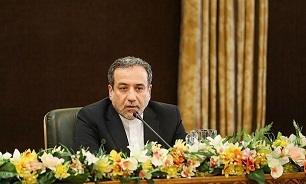Iran’s Oil Exports Main Topic of Long Talks with France
 Speaking to reporters in Slovenia a day after his 10-hour meeting with French officials in Paris, Araqchi said the focus of the negotiations with France was on how to meet the Islamic Republic’s demands on oil sales and its access to the revenues.
Speaking to reporters in Slovenia a day after his 10-hour meeting with French officials in Paris, Araqchi said the focus of the negotiations with France was on how to meet the Islamic Republic’s demands on oil sales and its access to the revenues.
“The Islamic Republic of Iran, as has repeatedly stated, will only return to the full implementation of the Joint Comprehensive Plan of Action (JCPOA) if it is able to sell its oil and receieve the incomes in a fully usable manner without any restrictions, and the French initiative is exactly in this line,” he said.
The top negotiator went on to say that in talks with the French president it was insisted that Europe should either buy oil from Iran or open a credit line equivalent to the value of oil sales, which means it should purchase the oil in advance.
Araqchi, heading a delegation, attended a 10-hour meeting with French officials about President Emmanuel Macron’s recent proposal to save the 2015 Iran nuclear deal.
Speaking to reporters at a press conference in Tehran on Monday, Spokesman for the Iranian Administration Ali Rabiei referred to recent talks between Iranian President Hassan Rouhani and his French counterpart, and said, “In the past few weeks, there have been serious negotiations between the two presidents."
“Fortunately, the views have become closer together on many issues,” he said, adding, “Technical discussions on European commitments are now underway.”
Iranian Foreign Minister Mohammad Javad Zarif said in a recent interview with the Sueddeutsche Zeitung newspaper that Tehran’s third step to reduce nuclear obligations would be taken on September 6 if Europe fails to meet Iran’s demands to fulfill its JCPOA commitments.
Back in July, Iran declared the second step to reduce its commitments by ramping up the level of uranium enrichment to over 3.67 percent.
Iran maintains that the new measures are not designed to harm the nuclear deal, but to save the accord by creating a balance in the commitments.
Iran and the Group 5+1 (Russia, China, US, Britain, France, and Germany) on July 14, 2015, reached a conclusion over the text of the JCPOA.
The accord took effect in January 2016 and was supposed to terminate all nuclear-related sanctions against Iran all at once, but its implementation was hampered by the US policies and its eventual withdrawal from the deal.
On May 8, 2018, US President Donald Trump pulled his country out of the nuclear accord.
Following the US withdrawal, Iran and the remaining parties launched talks to save the deal.
However, the EU’s failure to ensure Iran’s economic interests forced Tehran to stop honoring certain commitments, including an unlimited rise in the stockpile of enriched uranium.
Spokesman for the Atomic Energy Organization of Iran (AEOI) Behrouz Kamalvandi recently said that the country’s enriched uranium stockpile has reached 360 to 370 kilograms.
Message end/
